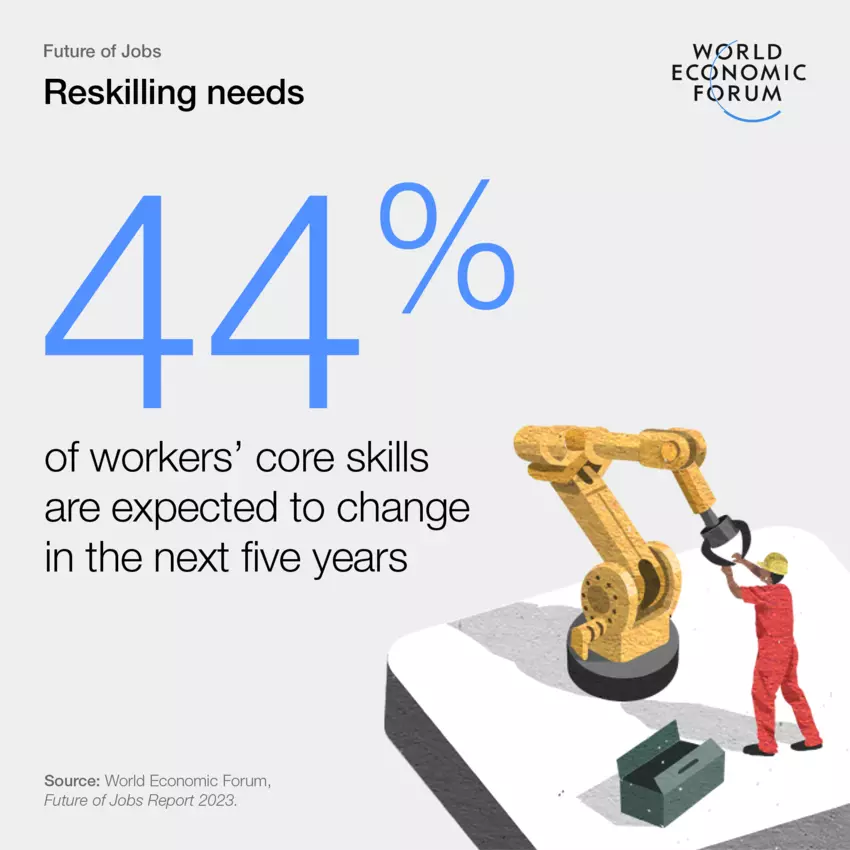As the world continues to embrace the transformative power of generative AI (genAI), the need for individuals to acquire new skills has become increasingly evident. This shift underscores a growing divide between those without access to AI skills.
To address this challenge, public and private partnerships are emerging as a crucial force in the reskilling revolution, aiming to prepare over a billion people for the AI-driven future. While AI disruption presents unprecedented challenges, it also offers solutions to mitigate its human costs.
Upskilling workforces for enhanced productivity
Organizations worldwide are reimagining their systems and processes with the integration of genAI. According to a recent Amazon study, 88% of workers anticipate using AI in their daily tasks by 2028.
The strategic focus is on upskilling the workforce, a practice that benefits employees, potentially raising their salaries by up to 47%, and unlocks substantial productivity gains estimated at around $4.4 trillion, as reported by McKinsey.
Effective collaboration between HR departments and people leaders is essential in developing structured, role-based learning pathways. These pathways incentivize employees to acquire crucial skills while harnessing the full potential of AI technology within organizations.
HR and learning and development (L&D) leaders report that executive leadership increasingly prioritizes L&D investments to ensure the success of technology ambitions.
The urgency to upskill is evident, with AI experts such as Andrew Ng launching courses like Generative AI for Everyone, garnering immense popularity. Partnerships like the GenAI Academy, established by DeepLearning.AI and Vanderbilt, offer executive and foundational literacy training to global workforces, further accelerating the upskilling process.
Reskilling pathways for new opportunities
The World Economic Forum’s Future of Jobs Report 2023 forecasts that 61% of workers will require retraining by 2027. To address this challenge, governments, businesses, and educational institutions must collaborate to understand evolving job roles and create relevant learning and career pathways.
Digital skills, in particular, are pivotal in supporting a digital economy and the development of advanced AI applications.
Industry micro-credentials provided by tech giants such as Google, Microsoft, and IBM have emerged as effective tools for institutions to address unemployment and swiftly prepare individuals for in-demand digital careers, including IT support, cybersecurity, and project management.
Initiatives like Saudi Arabia’s MCIT and UNDP Arab States offer these professional certificates for free, equipping citizens across the Middle East with essential skills. The University of Texas System extends these certificates to students, faculty, and staff.
Education from trusted experts to mitigate misinformation and bias
In a landscape where AI-generated content proliferates, the risks of misinformation and bias are real. High-quality training content from trusted educational institutions has become more critical than ever. Poor training could inadvertently embed inequity, bias, and misinformation into AI systems.
Leading AI authorities have responded by offering courses designed to help leaders grasp the potential and risks of genAI, avoiding misinformed hype. Courses like Prompt Engineering for ChatGPT from Vanderbilt University and Introduction to Responsible AI from Google Cloud aim to provide a balanced view of AI’s capabilities and limitations.
Additionally, ACE and ECTS Credit Recommendations for industry micro-credentials provide assurance, simplifying credit recognition for universities and increasing employer trust in applicants’ skills.
System-wide initiatives from institutions like the Kazakhstan MSHE and the University of Texas System offer blueprints for governments seeking to upgrade their higher education systems to better prepare youth for future jobs.
Personalized learning experiences for diverse populations
AI serves as both a disruptor and an enabler. When employed ethically and effectively, it has the potential to transform learning experiences, making them more personalized and interactive. This achievement has eluded traditional on-campus education at scale.
For example, Coursera Coach, powered by genAI and expert content, offers personalized assistance and feedback, adapting to various languages and educational levels.
As emerging technologies create new skill requirements and labor forces become more globalized, language barriers hinder collaboration, productivity, and economic opportunity.
AI has played a pivotal role in overcoming these barriers, translating over 4,000 courses and 35 industry micro-credentials into 17 languages, including Spanish, Arabic, and German. This makes learning accessible to millions worldwide, enabling global organizations to boost employee engagement and productivity.
Public-private partnerships are instrumental in navigating the opportunities and challenges presented by AI. By intensifying their focus on reskilling and upskilling initiatives, offering training from trusted institutions, and embracing AI-enhanced learning experiences, they can maximize the remarkable potential of genAI for our society and the broader world.





